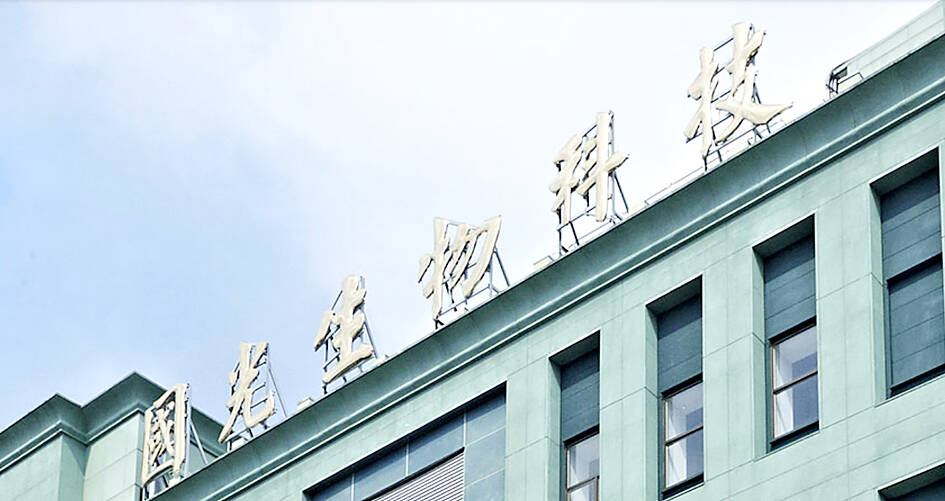Enimmune Corp (安特羅生技) has obtained marketing approval from the Food and Drug Administration (FDA) for its EnVAX-A71 vaccine for enterovirus 71 (EV-71), becoming the nation’s first enterovirus vaccine completely made in Taiwan, it said yesterday.
After spending 13 years and NT$1.5 billion (US$49.77 million) on the research and development of the vaccine, Enimmune plans to start manufacturing and marketing it by the end of March, the company said in a statement, without disclosing customer order figures.
“It is possible that the vaccine would not be included in a national vaccination program initially, and consumers would need to pay for it themselves,” parent company Adimmune Corp (國光生技) told the Taipei Times yesterday.

Photo courtesy of Adimmune Corp
“However, we are working with the government, and hope that this vaccine could be included in a national vaccination program for children, as EV-71 is a common pathogen that causes polio-like syndrome and can lead to severe sickness,” Adimmune said.
As the vaccine would be administered to children younger than five and each child would need to have two shots, the total demand for the vaccine in Taiwan is estimated at 300,000 doses per year, the company said.
EnVAX-A71 is designed to act against genotype B4 of EV-71, which is widespread in Taiwan.
Enimmune has signed a memorandum of understanding with a Vietnamese state-run vaccine company to collaborate on EnVAX-A71 and is to complete a phase-three human test of the vaccine in the country in the near term.
In the long term, the company aims to enter the Southeast Asian market where demand for an enterovirus vaccine could exceed 20 million doses, it said, adding that it also plans to enter the Chinese market.
Enimmune’s revenue grew 72 percent year-on-year to NT$188 million last year, while Adimmune’s revenue grew 37 percent to NT$2.25 billion, companies data showed.
Local rival Medigen Vaccine Biologics Corp (高端疫苗) is also developing an enterovirus vaccine in Taiwan, but has not yet obtained marketing approval after submitting an application in 2021.

CHIP RACE: Three years of overbroad export controls drove foreign competitors to pursue their own AI chips, and ‘cost US taxpayers billions of dollars,’ Nvidia said China has figured out the US strategy for allowing it to buy Nvidia Corp’s H200s and is rejecting the artificial intelligence (AI) chip in favor of domestically developed semiconductors, White House AI adviser David Sacks said, citing news reports. US President Donald Trump on Monday said that he would allow shipments of Nvidia’s H200 chips to China, part of an administration effort backed by Sacks to challenge Chinese tech champions such as Huawei Technologies Co (華為) by bringing US competition to their home market. On Friday, Sacks signaled that he was uncertain about whether that approach would work. “They’re rejecting our chips,” Sacks

It is challenging to build infrastructure in much of Europe. Constrained budgets and polarized politics tend to undermine long-term projects, forcing officials to react to emergencies rather than plan for the future. Not in Austria. Today, the country is to officially open its Koralmbahn tunnel, the 5.9 billion euro (US$6.9 billion) centerpiece of a groundbreaking new railway that will eventually run from Poland’s Baltic coast to the Adriatic Sea, transforming travel within Austria and positioning the Alpine nation at the forefront of logistics in Europe. “It is Austria’s biggest socio-economic experiment in over a century,” said Eric Kirschner, an economist at Graz-based Joanneum

BUBBLE? Only a handful of companies are seeing rapid revenue growth and higher valuations, and it is not enough to call the AI trend a transformation, an analyst said Artificial intelligence (AI) is entering a more challenging phase next year as companies move beyond experimentation and begin demanding clear financial returns from a technology that has delivered big gains to only a small group of early adopters, PricewaterhouseCoopers (PwC) Taiwan said yesterday. Most organizations have been able to justify AI investments through cost recovery or modest efficiency gains, but few have achieved meaningful revenue growth or long-term competitive advantage, the consultancy said in its 2026 AI Business Predictions report. This growing performance gap is forcing executives to reconsider how AI is deployed across their organizations, it said. “Many companies

Taiwan’s long-term economic competitiveness will hinge not only on national champions like Taiwan Semiconductor Manufacturing Co. (TSMC, 台積電) but also on the widespread adoption of artificial intelligence (AI) and other emerging technologies, a US-based scholar has said. At a lecture in Taipei on Tuesday, Jeffrey Ding, assistant professor of political science at the George Washington University and author of "Technology and the Rise of Great Powers," argued that historical experience shows that general-purpose technologies (GPTs) — such as electricity, computers and now AI — shape long-term economic advantages through their diffusion across the broader economy. "What really matters is not who pioneers